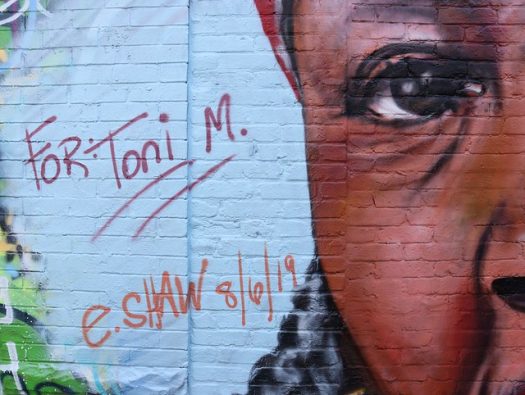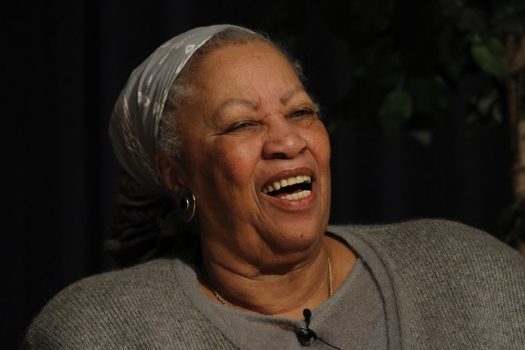Remembering Toni Morrison
By Guest | August 11, 2019 |
Please welcome longtime community member and author Elizabeth A. Havey to Writer Unboxed today. Elizabeth reached out to us shortly after Toni Morrison’s passing this week, to share an article she had written about the iconic and Nobel Prize winning author, poet, and thought-leader. It’s our privilege to share Elizabeth’s words here, in honor of Ms. Morrison and her incredible life. From Elizabeth’s bio:
Graduating with a BA in English, I taught literature at the secondary level and later worked as a freelancer for McDougal Littell Publishing and Meredith Books. I earned my RN in my forties and worked as an L&D nurse and health educator. I dedicated my summers to studying at the University of Iowa’s Writing Workshops. My stories have appeared in little magazines including The Nebraska Review and Zinkzine. I have published CEU’s for nursing and with James Wagenvoord, co-wrote and published Miami Ink. Born, raised and educated in Chicago, I now live in Southern California, but the spirit of the Midwest remains fresh in my fiction. I am a member of the Women’s Fiction Writers Association and I blog weekly at https://boomerhighway.org.
Learn more about Elizabeth and her book A Mother’s Time Capsule–“a collection of stories about motherhood, reflecting my love of literature and medicine”–on her website, and by following her on Twitter.
Remembering Toni Morrison
For me, reading has always been nourishment—the first stack of easy-reading books from our local Chicago library; then the heft of assigned books from high school and college teachers and professors. And always, the answer to the eternal question: What would you like for your birthday? Books.
Reading is beauty, reality, other worlds; reading increases widespread understanding, stimulates questioning, learning. And in 2018, because I read widely, I was alerted to an attack against reading itself.
The attack came in the form of letters to the editor in our local newspaper. Week after week, people in my community were complaining about assigned fiction and non-fiction works at our local high school. The books were: David Guterson’s Snow Falling on Cedars, Sherman Alexie’s The Absolutely True Diary of a Part-Time Indian, and Toni Morrison’s Sula.
These letter writers really went after Sula, as if this beautiful, honest book would change or damage the sexuality of every young person who read it. During this barrage of letter writing, I even considered the possibility that someone was prompting these writers, even funding them.
I wrote my own letter to the editor, supporting all three books, stressing that I had taught high school English and asking: didn’t these people realize that guiding students through difficult subject matter was how they would grow to become responsible adults? Tested and approved high school curriculum is always far better than reading “stuff” on the internet, where students can find articles on any sexual topic—and when they did, they most likely would not reveal what they had read, possibly becoming confused with no one to guide them or provide thoughtful understanding. The letter writers didn’t understand the very purpose of high school literature classes. They communicated narrow mindedness and prejudice.
I discussed the situation with the group of progressive women I belong to. We decided, that like Tip O’Neill believed, politics is local. We would fight this. We researched and got the names of the candidates for the school board who supported the current reading program. We interviewed each of them, held a garage sale, raised money and gave our proceeds to these candidates.
I thought of our efforts this past week when Toni Morrison died at the age of eighty-eight. Toni Morrison, the author of Sula, Beloved, The Bluest Eye, Song of Solomon, A Mercy and many others. Toni Morrison, who in 1993 became the first African American woman to receive the Nobel Prize for Literature and was lauded for being a writer “who in novels characterized by visionary force and poetic import, gives life to an essential aspect of American reality.” Yes, a reality high school students need to know! Being a woman of color, Morrison focused on language—how it can affect and deepen our American reality. If we do not have the freedom to express ourselves in language and to reveal the truths of our history, we are lost.
Morrison’s Fable of Children
In her Nobel Acceptance speech, Morrison told this story:
Once upon a time there was an old woman. Blind. Wise. …the woman is the daughter of slaves, black, American, and lives alone in a small house outside of town. Her reputation for wisdom is without peer and without question. Among her people she is both the law and its transgression. The honor she is paid and the awe in which she is held reach beyond her neighborhood to places far away…
One day the woman is visited by some young people who seem to be bent on disproving her clairvoyance and showing her up for the fraud they believe she is. Their plan is simple: they enter her house and ask the one question the answer to which rides solely on her difference from them…her blindness. They stand before her, and one of them says, “Old woman, I hold in my hand a bird. Tell me whether it is living or dead.”
She does not answer, and the question is repeated. Still she doesn’t answer. She is blind and cannot see her visitors, let alone what is in their hands. She does not know their color, gender or homeland. She only knows their motive.
Finally, the old woman speaks and her voice is soft but stern. “I don’t know,” she says. “I don’t know whether the bird you are holding is dead or alive, but what I do know is that it is in your hands. It is in your hands.”
Her answer can be taken to mean: if it is dead, you have either found it that way or you have killed it. If it is alive, you can still kill it. Whether it is to stay alive, it is your decision. Whatever the case, it is your responsibility.
What the blind woman has done is shift the power that these seeing people might have over her, and instead is reprimanding them for mocking her, but also for the life they might have sacrificed to do so.
Morrison then extrapolated on the purpose of her story.
- I choose to read the bird as language and the woman as a practiced writer.
- She is worried about how the language she dreams in, given to her at birth, is handled, put into service, even withheld from her for certain nefarious purposes.
- Being a writer, she thinks of language partly as a system, partly as a living thing over which one has control, but mostly as agency — as an act with consequences.
- So, the question the children put to her: “Is it living or dead?” is not unreal because she thinks of language as susceptible to death, erasure; certainly imperiled and salvageable only by an effort of the will.
- She believes that if the bird in the hands of her visitors is dead the custodians are responsible for the corpse.
Morrison’s Assignment
As writers, we have been left with a task, one Morrison wants us to aspire to. She writes:
Word-work is sublime … because it is generative; it makes meaning that secures our difference, our human difference — the way in which we are like no other life.
The vitality of language lies in its ability to limn (paint) the actual, imagined and possible lives of its speakers, readers, writers.
An amazing and worthwhile task.
And also: all the candidates that we supported for the school board won. The high school students in my school district are now reading Toni Morrison. I believe we all should.
Thanks to Brain Pickings’ article Toni Morrison and the Power of Language, which was a resource for this post.
Readers, do you have a favorite Toni Morrison story or quote you’d like to share? How did her words intersect with your life in a way that made a difference? The floor is yours.












What a beautiful tribute, Elizabeth, not only to Toni Morrison and her work, but also to this work we all do. And thank you for the stand you took against narrow-mindedness. You are a warrior.
Thanks, Susan. I do try. And will keep trying in the memory of Toni and others who understand the stakes we face.
This is beautiful to read today. I read The Bluest Eye first, in college in the late 80s. Then I read everything else. I was lucky to see her speak back in the early 90s. Everyone should read Toni Morrison. I was also lucky because my parents let me read anything. My grandmother had let my mom read anything, and my mom passed that gift to me.
Thank you for writing and sharing this.
I love the freedom that your parents gave you, the ocean of books you could dive into. It is a gift. In a reading family, one can always go to another reader, ask a question, discuss the words, the concepts, discover knowledge. Thanks for reading.
Ah, what a lovely tribute–the perfect way to start the writing week. Morrison’s assignment is such a needed reminder. Only I can tell my stories. Isn’t it weird how we need to be reminded again and again of the most basic writing truths and lessons (or maybe it’s just me)?
Wonderful seeing you here in the featured role, Beth! That seems like a natural, so I hope it’s far from the last time. Thanks for the generous portion of writerly fuel.
Ah Vaughn, you are such a great friend. Thanks for commenting. I do hope I can do more. The irony of all of this saddens me, as the bottom line is Morrison will no longer be blessing us with her great mind, heart and point of view. She is someone to treasure.
Wonderful tribute, Beth. Although TM is gone, because of people like you and others fighting to keep her language alive, her light will continue to spread and shine on.
Thanks, Brenda, that means a lot. I found another one of her novels that I haven’t read yet–it’s going with me on vacation. I am blessed and we are blessed to have had her thoughts, courage and her words.
Thank you for this insightful piece, Beth, and for your ongoing work in the struggle for justice and truth. I’m working on a WU piece for later this week looking at one of Morrison’s novels.
Thanks again for this tribute!
Best,
Nancy
Dear Nancy, so appreciate your support, your friendship. I look forward to your piece later this week. My book pile is going to grow as I read through all of Morrison’s work. Take care, Beth
I first read Toni Morrison when in college. Her wonderful book, Beloved was required reading for my literature class. To be honest, I probably would not have chosen to read this at that time as I was interested in a different genre. I am so happy that I didn’t miss out! I loved this book, it moved me emotionally and reinforced a love for historical fiction. She was truly a masterful author as well as a beautiful human being. Thanks for the tribute.
Thanks for your comment. I remember being on vacation and riding in the back of the car–reading BELOVED. My family keep reminding me to look out the window, but I couldn’t leave Morrison’s words or the pictures she was painting.
Lovely article. Do you have a link to the graffiti image?
Thanks, Mike. Therese Walsh kindly added the photo. You might contact her or try to pull it from this piece onto your desktop. It is a powerful image.
If you click the image, you’ll be taken directly to its page on Flickr.